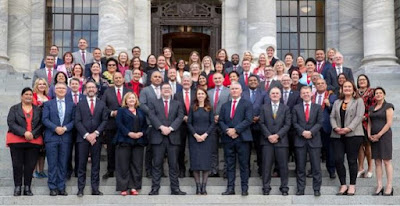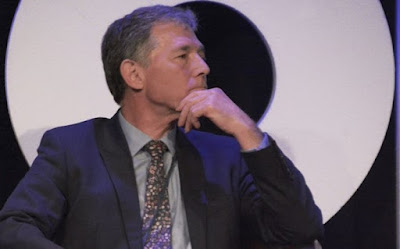Contrast the present Labour Government’s refusal to give the poor a happy Christmas with this little vignette from Labour’s past.
“Shortly after his election as Labour Party leader in 1961, Arnold Nordmeyer was asked by the New Zealand Broadcasting Corporation to recall for its listeners ‘My Most Memorable Christmas’. He spoke movingly of the first Labour Government’s decision, in December 1935, to advance the equivalent of an extra week’s relief payment to all the unemployed as a “Christmas Bonus”. That single act of state generosity, he said, sent ripples of hope and goodwill through thousands of destitute families and hundreds of cash-strapped communities. By Christmas, its effects were evident across the whole of New Zealand.”
Alternatively, there’s the extraordinary interview conducted by David Frost with New Zealand’s newly-elected Prime Minister, Norman Kirk, early in 1973. About 3 minutes into the interview Kirk talks about the letter he received from a disabled woman, thanking him for the special Christmas payment he made to all social welfare beneficiaries in December of 1972, and telling him what the extra money had made possible.
Jacinda Ardern is rightly celebrated for her communication skills and for her demonstrations of empathy, but set her performances alongside Kirk’s in that interview and the huge gulf that separates the current Labour Government from its predecessor of 1972-75 is immediately apparent. Yes, the world has become a very different place, and the conduct of centre-left politics has changed dramatically. But human compassion and political authenticity are just as easy to spot in 2020 as they were in 1973. Something has been removed from our political leaders, something important. What is it? And who took it?
The answer – appropriately enough – lies in the turbulent history of the 1970s. At the heart of that history was Capitalism’s ruthless fightback against what its intellectual leaders regarded as the unwarranted, and increasingly uncontrollable, inflation of democratic expectations.
Capitalism’s problem, in a nutshell, was that too many people wanted – and were demanding – too much. Across the industrialised West, decade after decade of rising prosperity had freed ordinary people, especially young people, from the relentless pursuit of bread and butter. Having secured their freedom from raw material deprivation, people were seeking the freedom to become something more than an employee, more than a consumer. Working-class men; women of all classes; people of colour; gays and lesbians: all of these groups were demanding the right to be considered – and to become – fully human.
Nowhere is this phenomenon better described than in Ariel Dorfman’s seminal book on cultural imperialism –
The Empire’s Old Clothes. In the first chapter of the book, Dorfman recalls being approached by a young woman from one of the shanty-towns that encircled Chile’s capital city, Santiago. Professor Dorfman, and some of his students, had come to help the shanty-dwellers repair the damage wrought by a recent flood.
“She came up to me and asked quite frankly if it was true that I thought people shouldn’t read photo-novels”, Dorfman writes – alluding to his crusade against the “industrial products of fiction.” Comics, soap operas, westerns, radio and TV sitcoms, love songs, films of violence: “you name it”, quipped Dorfman, “I had it under scrutiny.”
“So I stopped digging and answered her. It was true. I thought that photo-novels were a hazard to her health and her future.*
“She did not seem to feel any special need for purification. ‘Don’t do that to us,
companerito,’ she said in a familiar, almost tender way. ‘Don’t take my dreams away from me.”
A few years later, about the same time David Frost was interviewing Norman Kirk, Dorfman was in the same shanty-town for the opening of a new community centre – one of the many thousands of collective initiatives funded by the socialist government of Salvador Allende – when he encountered the same woman:
“I didn’t recognize her at first, but she remembered me. She came up to me, just like that, and announced that I was right, that she didn’t read ‘trash’ anymore. Then she added a phrase which still haunts me. ‘Now,
companero, we are dreaming reality.’”
For nearly 50 years now, this is the dream/nightmare that has driven the politics of the Capitalist West. How to prevent ordinary people from making their dreams real through collective action. Certainly, it is no accident that the “cure” for too many dreams began in Chile. After the USA had “made the economy scream”, and General Augusto Pinochet’s troops had gunned down Salvador Allende in his Presidential Palace, it was to Chile that the “Chicago Boys” – the followers of Milton Friedman – came to show the world how Capitalism could be kept safe from Democracy.
And the “lessons” from Chicago just kept coming. Across the Tasman, Labor Prime Minister Gough Whitlam’s government was deposed in a bloodless coup by his own Governor-General (and CIA asset) Sir John Kerr. Fortunately for ordinary New Zealanders, Norman Kirk’s untimely (and extremely convenient) demise in August 1974 obviated the need for such a dramatic intervention here. (Although the CIA did help out the National Party by facilitating the production of some killer campaign ads for the 1975 general election.) Then, of course, there was the plot to topple UK Labour Prime Minister Harold Wilson in 1976, and the final coup de grace against the very possibility of democratic socialism – the capital strike against the French socialist government of President Francois Mitterrand in 1981. If the Left ever wanted to govern again, then it would have to lower its sights – and its red flags.
Back in the 1980s, there was a story, probably apocryphal, about Mike Moore and the powerful Australian television series
The Dismissal – which dramatized the sacking of Gough Whitlam’s Labor Government in 1975. According to the story, Moore was determined to remind his colleagues about the dangers that lay in wait for Labour governments.
What Moore wanted his colleagues to appreciate was the overwhelming power that could be brought to bear against a government that threatened the interests of the people who really mattered. How vital it was to keep business on your side. How much damage the news media could inflict upon a political leader it didn’t like. How dangerous senior public servants could be if their ministers refused to accept official advice. Most importantly, he wanted to remind them of the risks posed to labour governments by stubborn idealists: politicians who refused to be guided by principled pragmatism and common sense. So Moore sat all his caucus colleagues down and made them watch every one of
The Dismissal’s six, hour-long, episodes.
Was Moore on to something? Had he drawn the correct lessons from the fall of so many democratic socialist politicians and governments? More importantly, had other centre-left politicians, in other countries, reached exactly the same conclusion? Is that why the world ended up with Bill Clinton, Tony Blair, Gerhard Schroeder, Francois Hollande, Helen Clark and Kevin Rudd? Or, turning the question around, is that why the campaigns of genuine leftists like Jeremy Corbyn and Bernie Sanders so consistently come to grief?
The beginnings of an answer may be found in the following passage, taken from a speech delivered to the prestigious Wellington Club on 3 November 2020 by the veteran political journalist, Colin James:
“With National weak, Jacinda Ardern has political space to push real reform. Will she? Can she? Will Grant Robertson? Can he?
“Grant Robertson has stuck to fiscal and monetary orthodoxy. Jacinda Ardern told me back in 2018 that earns Labour a ‘licence to govern’, that is, tolerance by business and other sceptics. That is a clue to their cautious mentality.”
A clue, says James. Surely it’s something a little more definitive than that? A key, perhaps? Yes, a key.
That phrase: “a licence to govern” brings into sharp focus so much which has been unclear to the tens-of-thousands of New Zealanders who voted Labour-Green in confident expectation of ushering-in a period of much-needed, but long-delayed, change. It explains why – in spite of her outstanding communication skills and empathy – Jacinda Ardern finds it impossible to follow the examples of Mickey Savage and Norman Kirk. Those leaders believed the only “licence” a party needed to govern was the one given to them by the voters in a general election. Forty-eight years on from the Labour landslide of 1972; forty-eight years after that young shanty-dweller proudly informed Ariel Dorfman that she and her comrades were “dreaming reality”; Jacinda Ardern knows better. To drive a capitalist economy, it is first necessary to obtain a licence – from the capitalists.
But, securing the “tolerance of business and other sceptics” is not an easy thing to do. There are so many self-denying ordinances one has to offer-up: no capital gains tax; no wealth tax; no return to universal union membership; no restoration of the unconstrained right to strike; nothing to empower or embolden that reserve army of labour we call beneficiaries; nothing that might upset the business community, dairy farmers, or the fishing industry; and certainly nothing to combat climate change which in any way threatens the capitalists’ sacred right to make a profit. Nothing, in short, that could possibly upset the status-quo.
The most frustrating aspect of Jacinda’s “licence to govern” proposition is that in both historical and practical political terms she is, almost certainly, correct.
It is important to remember that both Ardern and Robertson were working in the Beehive during Helen Clark’s first term as Prime Minister. They would have heard the stories about the grim “Winter of Discontent” that followed the creation of the Labour-Alliance coalition government in the early summer of 1999. How the New Zealand capitalist class threatened to “put away their cheque-books” if there was even the slightest hint that some of the Alliance’s left-wing policies were about to be enacted. How the Finance Minister, Michael Cullen, had to abase himself before the nation’s “business leaders” at the Auckland Club. How Helen Clark felt obliged to swear that Laila Harré’s employer-funded child-care would only be introduced “over my dead body”.
The old Marxists may rail against Ardern’s and Labour’s “incrementalism” but when challenged to come up with an alternative strategy for operating safely under neoliberal capitalism, the system which, for nearly fifty years, has decreed anything more ambitious than piecemeal and largely inconsequential legislation verboten, they generally mutter something about “revolutionary action” and head for the bar.
They’re right, of course. Neoliberal Capitalism, by declaring democratic socialism and social-democracy out-of-bounds in the 1970s and 80s has, wittingly or unwittingly, left revolution as the only viable option. Not only when it comes to once again making it possible for the wretched of the earth to “dream reality”; but also when it comes to rescuing the only planet we know of in the entire universe where ordinary people’s dreams of becoming truly free and fully human can be realised.
* It would be interesting to know what Ariel Dorfman (who is still alive) makes of the sort of communications hardware and software that has become ubiquitous in twenty-first century societies. So much more powerful and compelling than the photo-novels and comics of the 1960s and 70s, our PCs, lap-tops, tablets and cellphones have made the corporations who manufacture and control them masters of the planet. The “industrial production of fiction” which Dorfman complained of back then seems quaint when compared to the scale of contemporary cultural imperialism’s reach and power. That capitalism has placed a portal to its material and imaginative production in virtually every hand on the planet should give us pause. Perhaps, like the young shanty-dweller, we will only be able to start “dreaming reality” when we throw the masters’ “trash” away?
This essay was originally posted on The Daily Blog of Friday, 13 November 2020.













